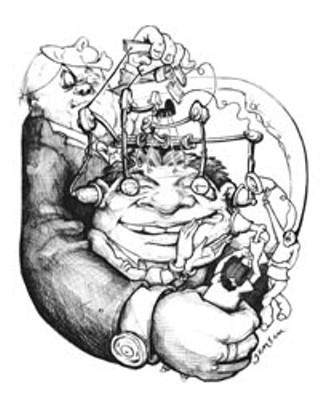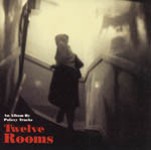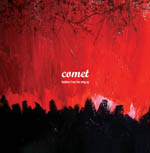Do Shepherds Dream of Digital Sheep?
Labels, lawsuits, and dystopian dread
By Michael Chamy, Fri., Aug. 8, 2003

"A man's worst difficulties begin when he is able to do as he likes." -- Aldous Huxley, Brave New World
2178: An Obstron Odyssey
A bead of sweat trickled down Max's forehead. His trixoral levels rose in anticipation as he felt the Obstron homing in on his thoughts. This evening's installment of The Report had been quite saccharine. What would the Obstron show next?
What sort of vidrome was in the works? The triumphant rainbow symphonies of Greenwich? An old-world classic like the newly reconfigured Radiohead vidrome for "Paranoid Android"? Or maybe the bubble-gum jump-cuts of Shelly, recently a fixture on the airborne Obstron units in the shift bases.
Whatever it was, it would be perfect. It always was. There was always Obstron to come home to. To beam into the portships. Obstron to aid the citizens in their workday achievements, to send low-level psi waves during shift hours.
Max often thinks of the dark days, 200 years ago, before Obstron technology and its ability to key in on human neurotransmitters. It was a savage era, as the whirlwind of science, art, and culture that had accrued over so many years reached critical mass, leading to a mental and cultural bottleneck.
Unable to sort through the endless barrage of data and imagery, people escaped by fixating on their own disparate interests, and society became hopelessly fragmented. It was always said that after the Internet the world would become one. It finally did, but it took the arrival of the Obstron to rescue the human race from its own cultural quicksand.
Now, thanks to the Obstron, all citizens are treated to the highest of highs, the lowest of lows, an endless breadth of ideas, emotions, and education, all in a safe, controlled environment. People are now able to grow individually, yet not apart from one another. Finally, the media of years past -- imperfect, biased forums like newspaper and television -- are obsolete. Thanks to Obstron, this is truly the greatest of times.
War of the eWorlds The battle for AD 2178 is being waged here, today, in 2003. It's a battle of worldwide scope, and it impacts how we give and receive information, both presently and in times to come. This battle, set in the courtrooms, classrooms, and computer labs of America, is between the general public -- either an army of cyberspace pirates or a group of citizens merely exercising their given right to share information -- and the music industry, either a totalitarian regime trying to hoard natural resources for their own benefit or a merry band of Robin Hoods trying to protect the rights of the starving artists they represent. It's a battle that has suddenly gotten very nasty.
The forces have been massing on either side since the advent of Napster and the rampant peer-to-peer file sharing of copyrighted songs. Finally, the lines have been drawn and crossed. The Recording Industry Association of America has begun litigation against more than 1,000 individuals for swapping digital music files. RIAA President Cary Sherman cavalierly suggested that this may be "only the beginning" of a prolonged campaign against the file-sharing public.
The proclamation comes on the heels of a ruling the RIAA won three months ago against Internet service provider Verizon Communications, requiring it to divulge the names of the infringing users. It was the Fort Sumter of this worldwide e-war. Since then, the RIAA has gone postal, issuing roughly 75 subpoenas a day. There was even a bill introduced to Congress last week that would make trading of copyrighted files a clear-cut felony.
All hail the new information age -- just be careful of what you're getting. It might reserve you a spot in the slammer. Even as the foundations of the Internet's MP3 utopia begin to crack under the RIAA attack, the industry has also made some long-overdue progress in its efforts to cater to the electronic consumer. Pay-for-play sites such as PressPlay, Listen.com's Rhapsody, and especially Apple's iTunes store have begun to make waves.
Even Napster founder and counterculture icon Shawn Fanning has been reduced to the role of corporate drone, taking on a consulting job at PressPlay, which is expected to be reborn as the new Napster sometime in the next year after a series of corporate transactions involving the former peer-to-peer's remaining assets.
So it may only be a matter of time before the Internet's intellectual utopia becomes a dystopian nightmare under the pabulum-slinging regime of the megacorporations. It may not happen soon, but history is on their side. Radio is already little more than the plastic stomping grounds of media giant Clear Channel Communications, and even the 500-channel spectrum of digital cable offers relatively little programming breadth considering its potential for diversity.
Meanwhile, the FCC continues to foment further deregulation of the media industry. A June 2 ruling by the FCC and Chairman Michael Powell, son of Secretary of State Colin Powell, clears the way for single companies to own newspaper, radio, and TV outlets in the same market.
"There is clearly a worst-case scenario, and it's the scenario we're headed to right now," warns Fred von Lohmann, senior staff attorney at the Electronic Freedom Foundation, a coalition of attorneys and technology specialists attempting to uphold civil liberties issues related to technology. "It's a scenario in which you have a few enormous corporations who control most of the authorized media outlets in the country, working hard to break the Internet, the last distribution mechanism which they don't completely control.
"They want to be able to monitor everything, they want to be able to track everything, they want to be able to control what you have access to."
Neuromancer
The world wasn't always such a fulfilling place. At night, Max often dreams of the great crisis years he has heard so much about, the time when poverty was rampant and man was unkind to fellow man, or even worse, apathetic. So wrapped up was everyone in their own petty worlds, there was no collective consciousness among the people of Earth like there is today.
The Information Age of the 21st century began so promising, with access to so many different cultural perspectives. Television channels numbering in the thousands, originating from all across the globe, complementing the incredible diversity of the World Wide Web. Yet eventually, people started gravitating to fewer and fewer channels, smaller pockets of interest as they lost interest in navigating the overwhelming digital seas.
Instead of coming together, the world was drifting apart like Pangaea. There were even vast numbers of malcontents thrown into rehabilitation for repeatedly accessing criminalized sites. Depression and suicides were at an all-time high, according to the history dromes. The time was ripe for some sort of guiding light.
It arrived in the form of ObSoft technology. At first it was found on home computers, installed in all new units as a means to guide consumers through the Web. Using traces of data and personal clues, ObSoft guided them to custom sites constructed for the users' enlightenment and entertainment.
It caught on steadily, as ObSoft was, of course, the only company that produced computers, or, for that matter, television. A merger of all the original leaders in the field, ObSoft overtook the rest of the multimedia industries by 2025. Their guidance services helped many people get their lives back in order, but it wasn't until years later that ObSoft became the chief architects of the great, global society of today.
Researchers eventually found a way to tap into the human mind, using the user's mood and memories as a programming guide. This progress, of course, coincided with the unification of television and computer. Affordable and popular, the Obstron grabbed an immediate foothold in households and workplaces across the world. Relief efforts were quickly formed to help provide needy people with Obstrons in poverty-ridden lands. So powerful were the mentally and emotionally enriching effects of the Obstron, it was generally agreed upon that it was well worth any cost to install it in every household on the planet. The world had already begun to unite.
I, Computer "It's a dangerous situation culturally when the companies that own most of the content also own most of the distribution," says Brad Hill, author of The Digital Songstream, a consumer road map/manifesto on the current state and immediate future of digital music. "It's top-down cultural programming, where our cultural environment is determined by very few people, and they're all the heads of corporations."
As the record industry wields napalm on one side, it offers sugar on the other, recently becoming more amenable to licensing songs to e-stores such as Rhapsody, PressPlay, and the suddenly popular iTunes, which boasted 2 million customers in its first two weeks. Hill doesn't see iTunes fully changing the mood of a marketplace in which millions of consumers regularly pull their music off the Internet for free.
"It's not a revolutionary service," Hill says of iTunes. "It's barely an evolutionary service. It's a step backward in some ways from online services that already exist."
Hill touts the paradigm of Rhapsody, which avoids the per-unit transaction, offering a large catalog for $10 a month, without the copy protection that iTunes has on its files. eMusic deals exclusively with independent labels such as Matador Records and hundreds of smaller operations. It has led to a deep selection including such notables as the Pixies, Mogwai, and NOFX, as well as an extensive jazz and classical selection and a reservoir of more underground music.
At $10 a month with no restrictions, Hill estimates that if you download an album a day from eMusic it comes out to 33 cents per album. These figures send chills down the spines of record-company moguls used to pulling in $17.99 per disc from the mall kids, many of whom have now figured out what kind of raw deal they were getting.
The artists, historically burned by unkind recording contracts, hold no sympathetic ear to the labels. Yet among musicians, the camp is still split as to whether the exposure afforded by the Internet is worth the potential loss of revenue.
Bottom line: The ongoing shift in formats from CD to straight digital audio will continue. Many details will have to be hashed out before record-collector fetishists can come to grips with the notion, but music will not remain trapped in physical form forever. As the computer continues to take over the functions of the television and stereo, the shift will make more and more sense. Eventually, a compensation system for the artists must be put into place, or they will end up seeing less and less revenue as online streams become the musical currency. It's doubtful the RIAA's strong-arm tactics will break the now-ingrained habits of the millions of users who download music from peer-to-peer networks such as KaZaA and Morpheus.
Many experts see only one sensible solution: a compulsory license. A flat fee would be paid to the Internet service provider, and the money would go into a pool to be divided up among all artists based on measurement statistics such as number of downloads.
Von Lohmann of the Electronic Freedom Foundation equates it to the compensation system currently in place in commercial radio.
"Today's deejays don't have to ask permission before they spin a disc," he explains. "They play whatever they want, and radio stations pay a blanket fee to groups like ASCAP and BMI that covers the copyright issue. That goes into a big pot, and they divide up the money among copyright owners."
Once upon a time, radio was accused of stealing music from the artists. After butting heads in court, radio and the industry eventually settled. The billion-dollar question is how an Internet-equivalent fund would be divided.
Will independent labels be part of such a process? (See "The Indies: Pebbles in the Stream," above.) Will labels even have a reason to exist? Though the proposition raises more questions than answers, the pressure to reach some sort of settlement increases by the day, as the RIAA serves subpoenas to 75 more possible felons guilty of nothing more than using what's readily available to them in their own homes.
Reality Bytes Max smiled at the unexpectedly tidy ending of the late-night drome. As he started to initiate REM mode, his thoughts again began to wander. In today's peaceful world, there was much time to reflect and little to worry about. Violence and criminal behavior had disappeared with the advent of the Obstron. Deserted are the incarceration facilities and even the mental institutes that were once commonplace.
Ironically, however, the ObSoft technicians were the only ones who did not get to enjoy its benefits. For maintaining the Obstron is such a consuming task that the programmers must remain vigilant at all times, and reportedly are not even allowed to take in low-level psi waves as they work.
As a result, there are rumors of depression and deviant behavior among Obstron programmers. Max has even heard that one programmer was caught partaking in the old chemical medications that used to cause so many behavioral problems.
It was a horrifying thought that such good men might go awry. But then every society has its heroes that sacrifice for the greater good. The Obstron programmers made the greatest sacrifice of all, never able to truly participate in the multisplendored world that they helped to create. Instead, they are forced to cope with pain, loss, loneliness, and emptiness as the rest of the world goes on living the ultimate dream. ![]()







